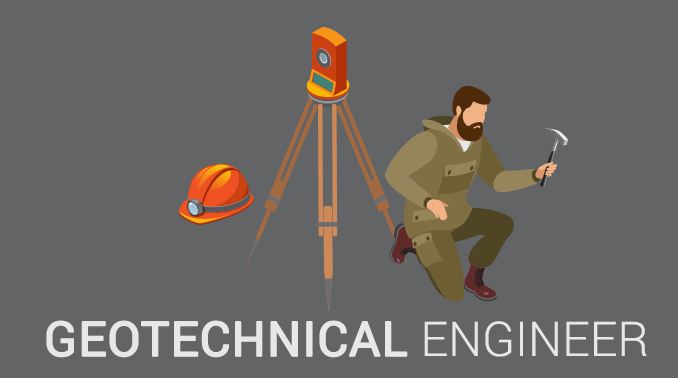The smart Trick of Geotheta That Nobody is Talking About
The smart Trick of Geotheta That Nobody is Talking About
Blog Article
Some Known Incorrect Statements About Geotheta
Table of ContentsThe Greatest Guide To GeothetaGeotheta Can Be Fun For AnyoneThe Best Strategy To Use For GeothetaHow Geotheta can Save You Time, Stress, and Money.The smart Trick of Geotheta That Nobody is Talking About

They conduct website investigations, collect examples, perform lab examinations, and analyze data to examine the viability of the ground for construction jobs - Tailings Engineer. Based on their searchings for, geotechnical designers offer suggestions for structure layout, slope stability, keeping structures, and reduction of geotechnical threats. They collaborate with other experts, such as engineers, structural engineers, and building groups, to guarantee that geotechnical factors to consider are incorporated right into the total project design and implementation
By evaluating the behavior and buildings of soil and rock, they can determine potential geotechnical dangers such as landslides, dirt negotiation, or incline instability. Their experience assists stop failures or crashes that could endanger lives and residential property. Here are some detailed duties and duties of a geotechnical engineer: Website Investigation: Geotechnical engineers conduct site investigations to gather data on subsurface problems.
They translate the data to comprehend the properties and behavior of the soil and rock, including their stamina, leaks in the structure, compaction features, and groundwater problems. Geotechnical Evaluation and Style: Geotechnical designers analyze the data collected throughout site examinations to analyze the security and suitability of the website for building projects. They carry out geotechnical computations and modeling to examine factors such as bearing capability, settlement, slope stability, side planet pressures, and groundwater circulation.
Some Ideas on Geotheta You Need To Know
Structure Design: Geotechnical engineers play a crucial duty in making foundations that can securely support the intended framework. They examine the soil problems and load needs to identify the suitable structure type, such as shallow structures (e.g., footings), deep foundations (e.g (https://pxhere.com/en/photographer/4325446)., heaps), or specialized methods like soil enhancement. They consider factors such as settlement restrictions, bearing capability, and soil-structure interaction to develop optimal foundation layouts
They examine building and construction plans, monitor website activities, and perform field inspections to validate that the design referrals are complied with. If unforeseen geotechnical concerns occur, they examine the scenario and supply referrals for removal or adjustments to the layout. Threat Analysis and Reduction: Geotechnical designers evaluate geotechnical dangers and risks connected with the task site, such as landslides, liquefaction, or dirt disintegration.

Collaboration and Interaction: Geotechnical engineers work carefully with other specialists associated with a job, such as architects, structural designers, and building teams. Effective communication and partnership are important to incorporate geotechnical considerations right into the total job design and building and construction process. Geotechnical designers offer technological knowledge, response questions, and make sure that geotechnical needs are met.
Some Of Geotheta
Here are some sorts of geotechnical engineers: Structure Engineer: Foundation engineers focus on making and examining structures for frameworks. They evaluate the soil problems, lots needs, and site features to establish the most suitable foundation kind and design, such as superficial foundations, deep structures, or specialized strategies like pile structures.
They evaluate the aspects affecting incline stability, such as dirt residential or commercial properties, groundwater conditions, and incline geometry, and develop approaches to avoid slope failings and mitigate dangers. Earthquake Engineer: Earthquake designers concentrate on examining and creating structures to endure seismic forces. They assess the seismic hazard of a site, assess dirt liquefaction capacity, and create seismic design requirements to make sure the check this safety and security and resilience of structures throughout quakes.
They execute area screening, accumulate examples, and assess the accumulated information to define the soil homes, geologic formations, and groundwater problems at a site. Geotechnical Instrumentation Designer: Geotechnical instrumentation designers focus on tracking and gauging the habits of dirt, rock, and structures. They mount and preserve instrumentation systems that monitor variables such as soil negotiation, groundwater degrees, incline activities, and structural displacements to assess efficiency and give early cautions of possible issues.
Geotheta Can Be Fun For Anyone
They conduct tests such as triaxial tests, debt consolidation tests, direct shear examinations, and permeability tests to collect information for geotechnical analysis and design. Geosynthetics Engineer: Geosynthetics engineers focus on the layout and application of geosynthetic materials, such as geotextiles, geogrids, and geomembranes. They utilize these products to boost soil stability, strengthen inclines, offer water drainage solutions, and control erosion.
They often tend to be investigative individuals, which means they're intellectual, introspective, and curious. They are interested, systematic, rational, analytical, and sensible. Several of them are also social, meaning they're kind, generous, cooperative, client, caring, useful, compassionate, tactful, and pleasant. Does this seem like you? Take our totally free occupation examination to discover if geotechnical designer is one of your top job suits.
In the office environment, geotechnical designers use specialized software devices to do calculations, develop styles, and assess information. They prepare reports, review job specs, communicate with clients and staff member, and coordinate project tasks. The office setup offers a favorable atmosphere for research, evaluation, and cooperation with various other professionals entailed in the job.
Get This Report on Geotheta
They often visit job sites to carry out site examinations, evaluate geotechnical problems, and collect information for analysis. These gos to include taking a trip to various locations, often in remote or tough surfaces. Geotechnical engineers may carry out dirt tasting, conduct tests, and monitor construction activities to ensure that the geotechnical elements of the task are being applied properly.
Geotechnical designers likewise work in specialized geotechnical labs. Geotechnical lab designers work extensively in these atmospheres, managing testing devices, operating instruments, and recording data.
Report this page